What’s Your Story?
February 7, 2016
Take a look around, we’re different. Our skin, our gods, our sexual organs/orientations and our experiences. We sit next to one another in class and just pretend not to notice. We depend on the internet and the television to tell us about our neighbors.
The girl in the hijab is Muslim, right? But is she Sunni or Shia? Is she Iraqi, Syrian, Turkish, Malaysian or Indonesian? I heard someone call the cafeteria “Chinatown,” I sat down at one table and received not only a brief history behind the Hmong people, but also what it is like to move from Hong Kong to Wisconsin. Considering the high racial tension in campuses around the country, and even around our own state, it was high time that students from our own campus were given a chance to speak.
It would be impossible to capture everyone’s story. There just isn’t enough time and there aren’t enough pages of this paper. In the next two editions of The Clipper, I will personally try to capture as many stories as I can. These stories will showcase just how different we are, from whomever is willing to open up and be vulnerable for the sake of an interview. In this piece, we will ask people where they come from. How students and their families uprooted themselves in the pursuit of freedom, and found their way to a community college half way across the world.
**Why is a white guy talking to me about race and stuff?
Good question. The reason I live in America, is because my family wanted to leave behind some not-so-cool stuff in Italy. I have heard stories of my family being spit on and referred to as “WOPs”, which references Italian immigrants who came over With-Out-Papers, “Greaseball” which is most likely because of our giant pores (which I hated as a teenager) and maybe because lasagna is basically a grease cake. I hope this article, and future articles, will open up a more accessible dialog between students. Because there are some really cool stories out there, and they may be overlooked if not sought out.
The Muslim Student Association promoting tolerance and knowledge. From left: Syahir Jami from Malaysia, Esra Alameedi from Iraq, and Sufayatu Issaka from Ghana.
What’s Your Story: Race
You’re not from around here, are you?
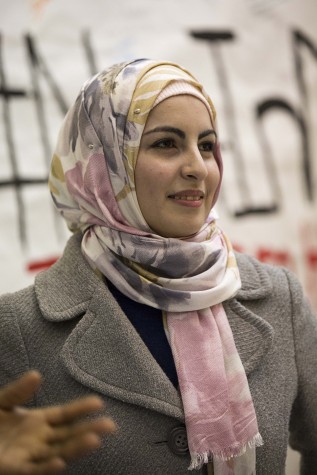
Sheyma Yousif, Sufayatu Issaka, Esra Alameedi and Syahir Jamil were passing out cake in a corner of Parks Student Union. Issaka had a Seahawks beanie on, and Esra’s face was partially covered by a hijab. Behind them was a giant paper banner that read, “#Notinmyname.” The reason this protest was being held can be summarized with one thought: “How is it, that they are fighting themselves?”
Issaka told me a story of how she was sitting in class and one of her fellow students could not understand how Muslims could possibly be fighting other Muslims. Issaka’s father left Nigeria before Boko Haram, an Islamic extremist group, rose to power. Yousif’s family ran from Saddam Hussein during the Halabja, when he was intent on wiping Kurdish people from existence, members of her family are currently fighting against ISIS.
When Alameedi was in middle school, someone told her to “go back to her own country.” She doesn’t want to go back to a place where “they will lock you up or they will kidnap you.” A place where “there is no freedom.” Issaka and Jamil find that they don’t typically face the blatant segregation their religion brings because of their dark skin, although they experience situations where their religion separates them from others.
Jamil who is from Malaysia, told me “two or three people will get on (the bus) wearing a hijab and the atmosphere in the bus suddenly changes. They kind of worry, like is this bus going to explode? I don’t know why, they are just wearing a hijab, and I can feel the tension.”
“Chinatown”
Stereotypes have a bit of truth to them, otherwise they would just fizzle out and die. The stereotype that there are a ton of Asian students who eat in the cafeteria, has a fair bit of truth to it. It isn’t an attack on anybody, everyone has to eat. Perhaps it provides a certain sense of community for those who feel as if they have none.
T.J. Cha is extremely outgoing, knows how to twerk and is a first generation Hmong. His dad told him that his name stands for Thomas Jefferson, but he figured that name was too white, so he asked his mom. His mom said that it didn’t stand for anything, it is just T.J. and sure enough, that is what is written on his birth certificate. Some days he might be Tyrone James, or maybe Tyson Jones. For someone so lighthearted, it is hard to tell that he is of a group of people who have suffered for hundreds of years.
The Hmong people were chased out of China during the Ming and Qing dynasties, and T.J. would like you to know that “for the record we aren’t all gangsters” as portrayed in the movie “Gran Torino.” After the exile from China, most Hmong people fled to Laos and Siam (Thailand.) During the Vietnam war, they sided with the American GI’s and were once again, pushed from their homes. Both of T.J.’s parents separately fled from Laos to Thailand and from there to California, where they met one another.
T.J. went to high school in Snohomish where he was, “The one Asian dude who breakdances and stuff.” When he came to Everett, it was an eye opening experience, “I was accustomed to only seeing white people and now I see Asians, and blacks, and Mexican people, and I’m like, this is cool! Like a present, and you weren’t expecting it.”
Across the table from T.J. sat Hiu Ching Lee. She was born in China, in a small town. But small town China was completely different from small town Wisconsin, where she first arrived on a student visa. “Cheese,” Lee told me, “Cheese, cheese, and cows!” She rode her first horse, and cleaned her first cow barn, the former being the happier experience. Lee was the only exchange student in Wisconsin, and for the first three months she really struggled with English and had no one to speak with in her native tongue. After becoming a cheerleader for her school in Wisconsin, things got easier but also much colder as it was always snowing. She feels less stressed at EvCC, and spends lots of time with other international students.
Financial aid and personal space
Eduardo Mendoza and Suyesh Singhel were eating vanilla pudding together in the Diversity and Equity Center. Compared to his studies back home in India Singhel feels no pressure from his impressive 21 credits, whereas Eduardo is stressed about being able to pay for school.
Eduardo’s family moved here from Mexico and gained citizenship in the late 80’s. They think college is a waste of time and want him to leave school so that he can work in construction and find a wife. The story of his grandfather working with his hands to bring the family to America hangs over his head.
Singhel is the 14th engineer in his family, he is from an area in New Delhi where people are business orientated but his family has broken the mold by pursuing professional education.
Singhel just learned what personal space is and finds it comical. “Living in India,” he says “it is such a crowded country that people don’t really think of these things.” He thinks people in America are friendlier than in India, but that there are no decent options for a strict vegetarian here.
What’s Your Story: Gender
More Complicated Than We Thought

Josh Matthews
“Boys go to Mars to get more candy bars, girls go to Jupiter to get more stupider.”
There was a space of time before puberty, before zits and boobs and the consequent confusion, when gender was that easy. You probably weren’t conscious of what it means to be masculine or feminine, of sexual identity or gender pronouns. The biggest questions in life revolved around macaroni art, the scariest moments were reading Goosebumps in the dark.
Now that we’ve grown a few inches and learned a few things, the battle between the sexes has gone past the sing-song insults. For the most part, we have discovered who we are and who we are sexually interested in, and we recognize the inequalities between genders.
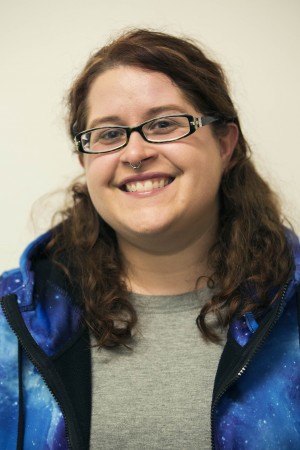
Erin Crum
“Over the last few years the federal government has looked at sex discrimination as a larger whole between men and women. Like men in the nursing programs or women in the mechanical or engineering programs.” Becky Lamboley, the title XI coordinator here at EvCC, said in an interview, “The pressure right now is on college campuses.” Her job is to create a space where people feel safe, everyone, all genders and even those who may see another gender/orientation as “wrong.” A space where conversations can occur to promote understanding. But a college’s voice does not come from the administration, it comes from the students.
Definitions
The dictionary’s definition of male and female isn’t entirely convincing. Male: “A person bearing an X and Y chromosome pair in the cell nuclei and normally having a penis, scrotum, and testicles, and developing hair on the face at adolescence; a boy or man.” Did you notice the “normally” in there? Ok, let’s try Webster’s College Dictionary definition of a female, maybe that can draw a more definitive line for us, “Designating or of the sex that produces ova and bears offspring.” For those men
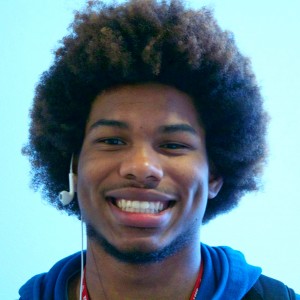
Melik Gaines
who can’t grow hair on their face and for women without children, it seems you are out of luck. Go find another way to define yourselves.
“I asked for a telescope and I got an EZ Bake Oven”
“Women have to prove themselves to be as capable as men, and then continue proving themselves. Once men have proven they are capable, they are trusted… It’s an uphill battle everyday.” Erin Crum explained. She became president of EvCC’s Society of Women Engineers after one quarter and she has been president now for two years.
In a traditionally male driven department such as STEM (Science Technology Engineering Mathematics) she faces obstacles. “It’s still difficult, there’s still a lot of sexism in the workplace, sex discrimination and sexual harassment. After dealing with it for so many years in schooling and then having to deal with it in the workplace, it pushes women out of STEM.”
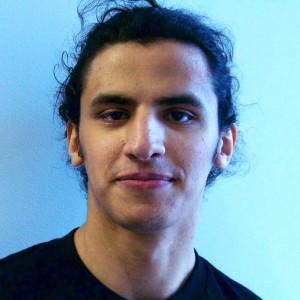
Khalid Al Sufyani
Crum deals with stereotype threat, which she describes as, “self fulfilling prophecies that we hear throughout life like:
‘Women are bad drivers, women are bad at math, women are bad at science, they’re nurturing, they’re not mechanical, they’re not logical and we learn these things from a very early age.’
We have to understand them to overcome them. Stereotype threat is something I face a lot.” It affects her anxiety and she has to remind herself every time she takes a test that if she fails it doesn’t mean that women are less capable, that it is okay to fail.
This isn’t something that started yesterday for her, or any other woman, “I believe gender is a social construction, like femininity is just our label for weak traits.”

Kori Keniston-Landberg
Because many thousands of years ago men wanted to make women property, so all the weak traits were applied to a feminine construct and all the strong traits were attributed to masculine constructs. Like men are “ambitious” and women are “bossy”. Men are “attentive” if they’re just listening, women are “shy” when they’re listening. When women are children they are told to be safe, “don’t get your dress dirty, don’t touch that, give that to your brother and let him do that. Boys will be boys.” Girls are told this all the time growing up.
For Crum as an individual, having conversations and self reflection are a start. “Being aware of that has helped me stress less about failing. Girls are taught we have to be perfect growing up; learning how to fail is really difficult. If a girl fails a class once, you are told to move on, you’re just not good at it… My plans are to get my undergrad, get my masters, get my Phd, that’s the goal. And hopefully all the things I’m learning as president, as a leader, I’m hoping it will make me more resilient to face the bullshit.”
Queer Questions, Straight Talk

Adrienne Garl
At the “Queer Questions, Straight Talk” meeting hosted by MEChA, the students were all faced with the same question, “What is gender?” The overwhelming response was that “Gender is fluid… Gender is messy, gender is complex. We’ve tried to nail it down to male or female, but then you have people who feel outside of that.” Such as transgender and intersex people, these people want to be liberated from gender, or at least the ones forced onto them.
Machismo is the extreme definition of masculinity in Latino communities, explained by students at the meeting. In machismo, “the man works, drinks and smokes and the woman takes his shit.” For the women in these types of communities, they feel the need to be submissive, they feel they have to be a “delicate little flower.” One student went as far to say that it is her responsibility to cook and clean, “if a man told me to sit down and relax it would freak me out, because it would feel like my power was taken away.”
Students Take a Shot at Defining Their Own Gender Identity
“That’s a very difficult question, I consider myself pretty feminine. I’m girly, I like to shop, I like to wear make-up. I’m not necessarily sure if that is what femininity is. That’s hard. Oh man… I feel like a strong woman, and I take initiative. I own my own business, it’s not just girly things.” –Brittney Landstrom
“I feel most manly when I’m in the gym. In high school I could lift almost 400 pounds on a deadlift. In the gym, lifting the weight no one else could. Yeah, that feels great. Maybe it’s not when you feel like a man, or more like a woman, but when you feel like a successful human being.” –Josh Matthews
“When I play sports, when I feel better in my body… Depending on what you want to feel, whether it be masculine, feminine or in between. Which ever one you decide to be, is when you’re going to feel your best.”–Kori Keniston-Lundberg
“As I was growing up I had to learn how to be a man. They told me if I want something, I have to go get it. It’s not just for men, it’s for everyone. [Being a man] It means everything to me, I am capable of doing whatever I want. A man should respect a woman… Sometimes a woman gets emotional, you shouldn’t say anything that’s going to offend her… And no one told me how to do that.” –Khalid Al Sufyani
“Being a man is taking care of your family. To be a man… Those are hard words, a lot of men are men, but they aren’t ‘men.’ Being a real man is like, you have to have respect… I didn’t grow up with a dad. There were six boys and our mom… As one of the younger kids [I] had to step up and take care of a lot of business… We also have to stop when we think… We don’t know how to close our mouths sometimes, when we’re talking to our woman, you know.” -Melik Gaines
“If a guy takes more pictures of himself than a woman, than he is a narcissistic bastard and should go to hell.” –Adrienne Garl

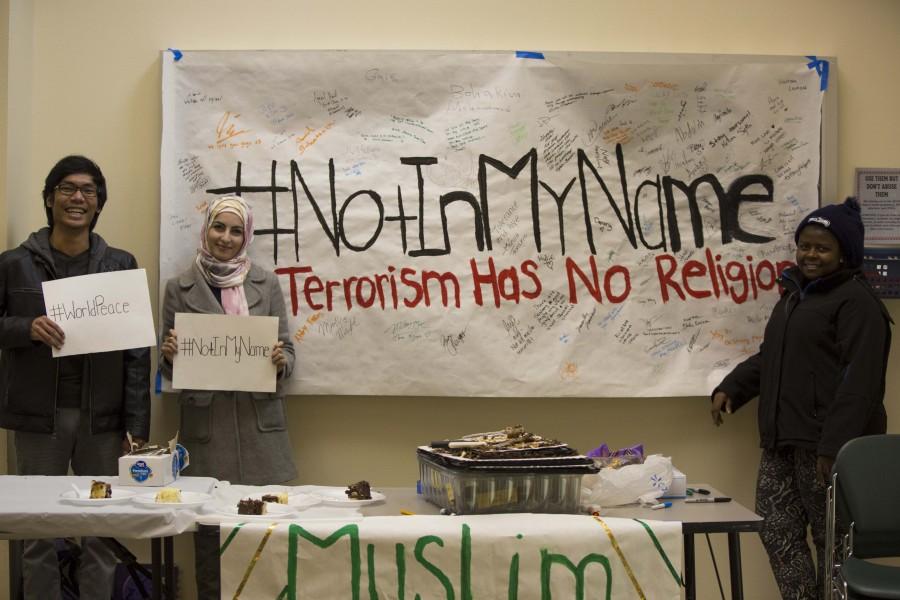
Barbara • Feb 12, 2016 at 11:07 pm
What a beautiful piece. My younger daughters grew up as 3rd culture kids and I always thought it was wonderful that they were able to get to know so many kids from different countries. I applaud what you are doing here.